- Home
- Joel C. Rosenberg
Damascus Countdown Page 2
Damascus Countdown Read online
Page 2
He looked to the street, searching for the taxi he’d asked to wait. It was nowhere to be seen, but he could hardly blame the driver. People were panicked from the gunfire, the car bombing, and the air strikes. They were fleeing as rapidly as they could in every direction. David knew he had to get away as well. He couldn’t afford to be caught by the police and dragged in for questioning. He had a mission. He had a plan. He had a team that was counting on him. He knew he had to stay focused, yet he grieved for those wounded around him. So he turned and rushed to the side of one severely wounded guard who was slipping into unconsciousness. Hearing sirens approaching from every direction, David took off his jacket and used it to put pressure on the man’s bleeding leg. As he did, he silently prayed over the man, asking the Lord to comfort and heal him.
Ambulances began arriving on the scene. Paramedics were soon rushing to the wounded to triage them and get the most critical cases to the nearest hospitals. Amid the chaos and confusion, David saw his opportunity. He took a pistol off the wounded bodyguard and slipped it into his pocket. Then he moved to another of the downed guards. The man seemed to be staring up at the sky. His mouth was open. But when David checked for a pulse, he found none. David closed the man’s eyes, then quickly lifted a spare magazine and took the guard’s two-way radio.
Firefighters were now arriving to battle multiple blazes. More police officers were pulling up as well. They began to secure the crime scene and interview what few witnesses had not fled the scene quickly enough. David tried to use the commotion as cover. He was determined not to be questioned, much less exposed. But then he heard someone shouting behind him. David turned and saw an elderly cleric, blood splattered all over his robes, pointing at him.
“Talk to that man!” the cleric said to a police officer. “He was here when all the shooting started. And I think he just took something off that dead body.”
The policeman looked directly at David and ordered him to stop. David didn’t dare. With a surge of adrenaline, he pivoted hard and began sprinting into the blazing wreckage of the mosque. The officer shouted again for him to halt and began running after him, blowing a whistle and calling other officers to join the pursuit.
2
Everywhere David looked through the thick, black, acrid smoke, he saw a labyrinth of ruins of a once-glorious mosque and flames shooting twenty and thirty feet in the air. Racing through the maze—the heat already unbearable and his shirt almost instantly drenched in sweat—David searched frantically for daylight and fresh, cool air. He knew there was more parking on the other side of the compound. His only chance of escape was getting out of this firestorm, finding a car, and somehow hot-wiring it before he was gunned down or captured by the Iranian police.
The farther he ran into the cooking ruins, the more fearful he became of running into a cul-de-sac of sorts and finding himself surrounded, his exit route cut off by men with guns. The roar of the crackling, leaping flames was nearly deafening, and soon he could barely hear the shouts and the whistles, but he had no doubt they were hot on his heels and closing fast.
He turned right down one alley and came to a fork. He said a quick prayer and took the lane to the left. As he ran, he pulled the pistol out of his pocket and made sure it was loaded. He looked up just in time to see a gigantic pillar ahead of him crumble at its base and then collapse across his escape route. Had it happened a second later, David knew he would have been crushed. Had it happened two seconds later, he would likely have been safe, the pillar blocking his pursuers’ path. As it was, he had no choice but to turn around and head back to the fork.
David raised the pistol in front of him and quickly retraced his steps. As he neared the fork, he could see two figures racing toward him through the smoke. He heard something whiz by his head, followed a split second later by the sound of a gunshot. Diving to the ground, he rolled once, took aim, and fired twice. Both men fell in succession, but David had to assume more were right behind them. He bolted down the other path, had to duck under several flaming beams, but soon found himself clearing the mosque compound and reaching the rear parking lot.
The scene before him was absolute mayhem. Anyone who had a car was in it, and they were all stuck in a massive traffic jam, trying desperately to get away from the mosque and onto the main highways back to Qom or Tehran. For the most part, the only vehicles closest to him were fire trucks and ambulances. David could see a few police cars with their flashing lights near the exit, and several uniformed officers trying to direct traffic and establish some sense of order. It all seemed futile, but he was glad the police anywhere near him at the moment were too busy to pay him any mind.
Just then David spotted two police motorcycles coming around the bend about five or six hundred yards to the south. He pulled back and crouched behind a pile of rubble, hoping the billowing smoke had obscured his movements. For now, it seemed to have. The motorcycle cops approached rapidly, then slowed and patrolled up and down the parking lot. David was certain they were looking for him, and then—as if they had just received a report on their radios—they both stopped, dismounted, drew their weapons, and ran around the far end of the compound. David grabbed the two-way radio he had lifted off the guard near the front gate. He turned it on low and put it close to his ear. As it crackled to life, he could hear someone shouting that the suspect was last seen moving along the west side of the complex. David had no idea who that might be, but it wasn’t him. He was on the east side, and he seized the moment, certain the confusion on the part of the police was temporary at best.
He made a dash for the motorcycles. Neither was running, and neither officer had left his keys in the ignition. But David picked the nearest one and quickly went to work. He pulled out his pocketknife, smashed open the odometer, yanked some wires behind the dials, and clipped off a six-inch piece with one quick movement. Then he kicked the bike over and rapidly stripped the insulation off both ends of the wire. Putting away the knife, he moved to the second bike and quickly found the bundle of three colored wires coming out of the ignition. He followed those to the back of the bike until he found where they ended in a small plastic connector plugged into another set of wires. Glancing from side to side and still seeing no one near him, he unplugged the connector, took the piece of wire from the first bike in his hand, bent it into a U shape, and stuck it into both slots of the connector. He had to fiddle with it a few times to get it right, but after several tense seconds he heard the bike click on. He checked the headlight. It was shining. So he jumped on the bike and hit the ignition button on the throttle. The cycle roared to life.
At that moment, David saw the two officers coming back around the far side of the compound toward the parking lot. Stunned at first at seeing someone stealing a police motorcycle, both officers drew their weapons and began to fire. David pulled his pistol and returned fire, sending both men scrambling for cover. Then he turned and fired two shots at the toppled bike’s gas tank. The second shot was a direct hit, and as soon as he saw the fuel spurting out, he fired again, creating a spark. The vapors ignited, and the tank exploded, sending pieces of the cycle flying in all directions.
David now raced toward the exit. Weaving through the snarled mass of cars and vans and buses trying to leave the mosque grounds slowed him down a bit, but he soon cleared all that and got off the local roads he feared would be clogged with cops. He found an on-ramp to Highway 7 and took it. Soon he was headed north from Qom to Tehran, on the open road and doing ninety. At the moment, almost no vehicles were on this particular stretch of road except an occasional convoy of army vehicles. Yet no one seemed to notice him or care. He had no helmet. He was certain the two officers had already radioed for backup. He fully expected a roadblock waiting for him around every bend. But right now he was alive and free and racing back to the CIA’s safe house in Karaj, a city northwest of Tehran, where he had told his team to reconverge.
Just then David saw a pair of Israeli F-15E Strike Eagles streaking across the horizon ahead of hi
m. Flying at about ten thousand feet, they banked left and made an arc around the mountains to his left. Suddenly the sky erupted in fire from antiaircraft artillery batteries hidden behind a small berm half a klick up the road. David was transfixed as he watched the Israeli jets bob and weave and roll through the triple-A fire, all the while trying feverishly to gain altitude. He cheered as one of the Strike Eagles pulled back and shot nearly straight up into the air like a space shuttle headed for the stratosphere. But as his wingman tried the same maneuver, David saw some of the tracer fire clip the tail of the second Israeli jet. Smoke began to pour out of the plane, and it was no longer climbing. In fact, David could see that one of the jet’s engines was on fire. The plane began spinning wildly out of control and hurtling back toward the earth. David couldn’t imagine how the Israelis were going to survive. They were only a few thousand feet off the deck and coming down fast and hard.
He watched as the canopy exploded off the top of the jet and both the pilot and his weapons officer ejected. Two parachutes deployed almost instantly, moments before the F-15 smashed to the ground in a fireball that would have been dazzling if it had not been so terrifying. David’s gratitude that the pilots had ejected in time quickly evaporated as he realized what would be done to the men if they were caught by the Iranians. Without taking the time to think it through, he took the next exit ramp off Highway 7 and hightailed it to a spot in the desert just outside the Shokohie Industrial Zone, where he suspected both men would soon be landing.
David made a wide berth around the factories, warehouses, and restaurants, lest he run into any local law enforcement. He sped along a series of side streets and then went off-road. To his left, he could both see and smell the burning fuselage of the Strike Eagle, and after a few more miles, he came upon the first parachute and got off the motorcycle. He called out in English, assuring the downed Israeli that he was an American, not an Iranian, but he got no response. He called out again several times, but there was still no reply. Was this guy badly wounded from the ejection or the landing? Or was he lying low, planning an ambush when David got close?
David thought about drawing his pistol but decided against it. Instead, he raised both arms above his head and kept calling out in English. He spotted a leg sticking out from under the chute. Cautiously he approached, still shouting in English that he was an American coming in peace. By the time he finally got to the Israeli’s side and pulled the chute off his face, however, it was clear that he was dead. Indeed, the body was badly burned, the face nearly unrecognizable. The pungent stench of the charred body was revolting, but David forced himself to check the man for identification or papers of any kind. He found nothing. Anything the man might have carried had been burned away.
David ran back to the bike and continued driving—more slowly this time—in search of the other parachute. It took several minutes, but he finally found it. He parked the bike near several large boulders, turned off the engine, removed the piece of wire, and put it in his pocket; then he walked carefully toward the chute, once again repeatedly calling out in English. But when he got to the chute, there was no one to be found. He looked behind several rock outcroppings but still found no one.
The satphone in David’s pocket began vibrating again. This time he pulled out the phone and took the call.
“What in the world are you doing?” asked the voice at the other end.
It was a voice David knew all too well—that of Jack Zalinsky, his Agency handler.
“Trying to save the life of an Israeli fighter pilot,” David replied. “You got a problem with that?”
“That’s not your mission,” Zalinsky said.
“You want the Iranians to capture him?” David asked. “You know what they’ll do to him?”
“What do you think they’ll do to you if they catch you?” Zalinsky pushed back. “What do you think the Mahdi will do when the Revolutionary Guards bring him the battered, beaten, broken, half-dead body of the CIA’s most valuable undercover operative? There’s already an Iranian special forces unit approaching from the south. And a helicopter just lifted off from the IRGC air base south of Qom, filled with heavily armed commandos. Now get on that bike and get out of there before you get yourself captured. That’s an order.”
David was about to argue, but he knew Zalinsky was right. He hung up the phone and ran back to the motorcycle and was about to hot-wire it again when he was coldcocked by someone who jumped him from behind.
His vision blurred, and he abruptly found himself on his back, staring up at a hazy figure standing over him and pointing a 9mm pistol at David’s head.
“Who are you?” the man asked in perfect Farsi.
“What happened?” David asked, his vision still blurry but coming back.
“Don’t move or I’ll blow your head off,” the man said.
As his head began to clear, David could see that the man was, in fact, the Strike Eagle pilot for whom he’d been looking.
“I’m not Iranian,” he replied in English. “I’m an American. I’m here to get you out of harm’s way.”
The Israeli was clearly startled by hearing English, but he wasn’t buying any of it.
“You’re driving a police motorcycle.”
“I stole it,” David said. “Do I look like a cop?”
“You were carrying a police radio and a pistol specially made for the Iranian police,” the Israeli retorted. “And why are you carrying a satphone?”
“Because I’m an American,” David said again. “Look, we don’t have much time. There’s a special forces unit approaching from the south, and there’s a helicopter coming up from Qom packed with Revolutionary Guards. I can get you out of here, get you to a safe house and out of the country. But we’ve got to move now.”
“I don’t believe you,” said the Israeli.
“I don’t care,” David said. “It’s true. And if we don’t move now, we’re both going to die a very painful, very gruesome death.”
David’s heart was racing. It was clear the Israeli still didn’t believe him. And why should he? But they really were out of time.
“Fine,” said the pilot. “Have it your way.”
He pulled back the pistol’s hammer and was about to fire when he instead collapsed to the ground as a gunshot rang out from somewhere to David’s left. The pilot had been shot in the head, no doubt by a sniper hidden in the rocks several hundred yards to the west. That, David figured, was where he would be if the situation were reversed. He grabbed the pistol that had fallen from the Israeli’s hands and ducked behind a boulder as two more shots rang out.
David heard the roar of a helicopter coming up over the ridge. As he tried to squeeze himself farther behind the boulder, he saw the chopper rise into view. His heart was pounding. His hands were shaking. He looked everywhere, but there was nowhere to hide.
The chopper stopped climbing and went into a stabilizing hover. He watched as the side door opened and one of the commandos on board fed .50-caliber rounds into the side-mounted rotary cannon. David raised his pistol and fired every shot in the magazine. None of them hit its mark. The chopper was just far enough away. Now the commando aimed the Gatling-style gun at David’s head and smiled.
But then David heard a high-pitched whistle coming from the west, and as he watched, the chopper exploded and fell from the sky. David, waiting to meet his Maker, couldn’t believe his eyes. What had just happened?
His question was answered when an Israeli Strike Eagle roared past and climbed for the stratosphere. He had avenged his wingman, and now he was gone. David watched the glow of the F-15E’s afterburners, then forced himself back to the moment. He had no idea where the sniper team was, but he prayed they were as distracted by the missile strike and the retreating fighter jet as he was.
This was his only chance. He wasn’t getting another. David scrambled to the motorcycle, hot-wired it again, then jumped on and hit the gas. The whole thing took less than ten seconds, and he was gone.
He hadn
’t staved off the war. He hadn’t saved either Israeli airman. But miraculously, he hadn’t been captured or killed either, and for right now, that was more than enough.
3
WASHINGTON, D.C.
Security was airtight as Marine One landed on the South Lawn.
Sharpshooters and spotters were in position on the roof of the White House and in the Eisenhower Executive Office Building, carefully scanning for any hint of trouble. Bomb-sniffing dogs and their handlers patrolled the grounds of the eighteen-acre White House complex. Heavily armed members of CAT—the Secret Service’s Counter Assault Team—took up positions while patrol cars from the Service’s Uniformed Division sealed off all streets around the presidential residence, towed away any unauthorized vehicles, and completed a thorough sweep, looking for weapons, explosives, or suspicious persons anywhere within striking distance of the incoming commander in chief. So far, they had found no one and nothing out of the ordinary, but it hardly made any of them breathe easier.
It was just after midnight on a bitterly cold late-winter night. The nation’s capital was covered in an icy crust of snow, and a brisk easterly wind continued driving down the already-frigid temperatures. Bundled up in a thick wool dress coat and closely flanked by his Secret Service detail, President William Jackson stepped off the gleaming green-and-white chopper and proceeded not to the Oval Office but directly and quickly to the Situation Room, where he was met by CIA director Roger Allen, his national security advisor, his chief of staff, and several senior White House aides.
“Where are we?” asked the president, handing his coat, scarf, and gloves to an aide and taking his seat at the head of the table.
“Mr. President, we are facing a critical threat to our national security,” Allen said bluntly.
“Proceed.”
“Mr. President, the positive progress is that the Israeli air strikes have been enormously successful. At this point, our assessment suggests they have degraded 95 percent of Iran’s nuclear facilities, destroyed 75 to 80 percent of Iran’s radar systems, gained effective control of Iranian airspace, and sent the regime into hiding. Most importantly, we believe the Israelis have destroyed six of Iran’s nuclear warheads. The problem, Mr. President, is that two of the warheads remain intact, viable, and operative and are presently unaccounted for.”

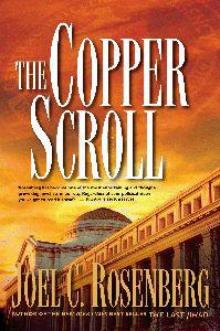 The Copper Scroll
The Copper Scroll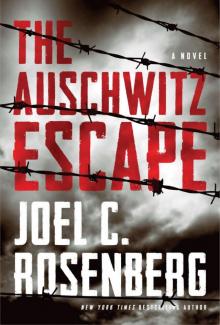 The Auschwitz Escape
The Auschwitz Escape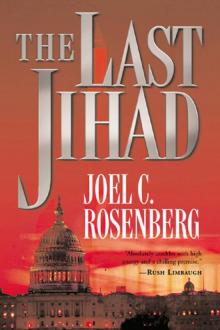 The Last Jihad
The Last Jihad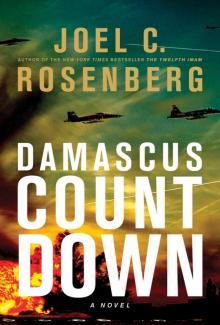 Damascus Countdown
Damascus Countdown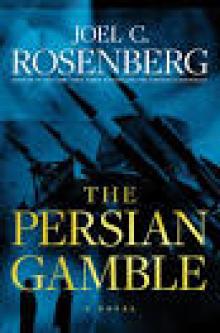 The Persian Gamble
The Persian Gamble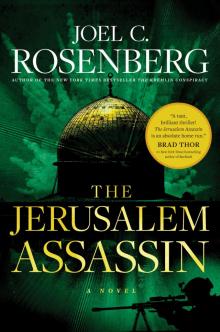 The Jerusalem Assassin
The Jerusalem Assassin Dead Heat
Dead Heat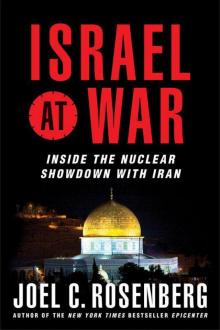 Israel at War: Inside the Nuclear Showdown With Iran
Israel at War: Inside the Nuclear Showdown With Iran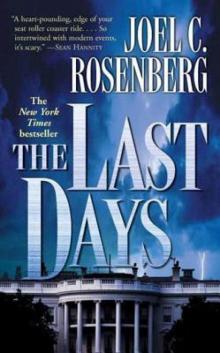 The Last Days
The Last Days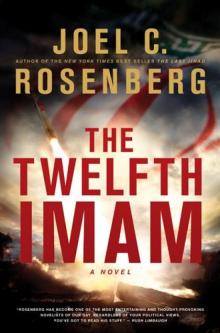 The Twelfth Imam
The Twelfth Imam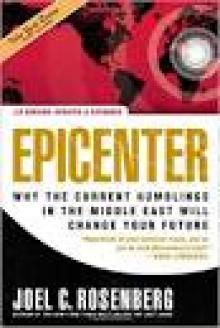 Epicenter 2.0
Epicenter 2.0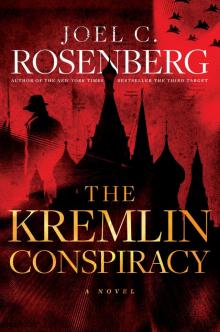 The Kremlin Conspiracy
The Kremlin Conspiracy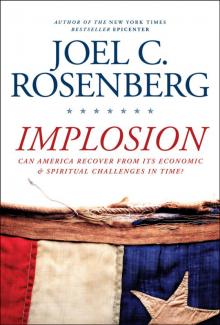 Implosion: Can America Recover From Its Economic and Spiritual Challenges in Time?
Implosion: Can America Recover From Its Economic and Spiritual Challenges in Time?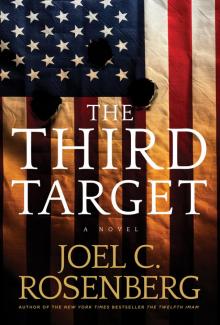 The Third Target: A J. B. Collins Novel
The Third Target: A J. B. Collins Novel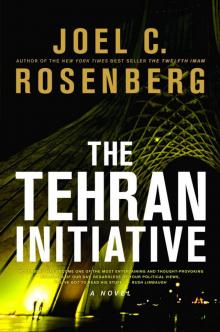 The Tehran Initiative
The Tehran Initiative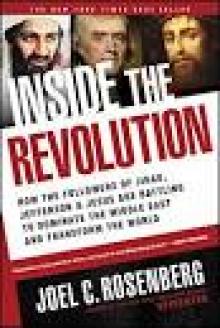 Inside the Revolution
Inside the Revolution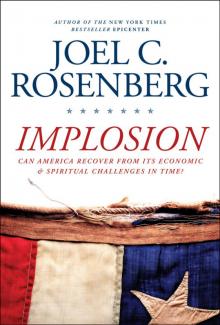 Implosion
Implosion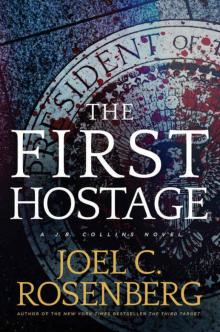 The First Hostage: A J. B. Collins Novel
The First Hostage: A J. B. Collins Novel